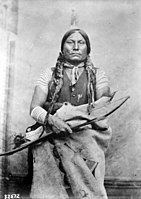David Francis Barry
David Francis Barry | |
|---|---|
 David Francis Barry 1910 | |
| Born | 6 March 1854 Honeoye Falls, New York, United States |
| Died | 6 March 1934 (aged 80) Superior, Wisconsin, United States |
| Occupation | photographer |
| Nationality | American |
| Genre | Native Americans, Lakota Sioux, early reservation period |
| Notable works | portraits of Sitting Bull, Gall (Phizi), Rain-in-the-Face |
| Spouse | Margaret "Patty" Young |
David Francis Barry (March 6, 1854 – March 6, 1934) was a 19th-century photographer of the American West.
Early life[]
Barry was born in Honeoye Falls, New York,[1][2] son of Irish immigrants Edmund Barry, shoemaker and of Bridgett, née Brophy.[3][4] In 1861, his family moved west to Otsego, Wisconsin[1][2] and the following year to nearby Columbus. While growing up in Columbus, Wisconsin David F. Barry landed odd jobs assisting an itinerant photographer named Orlando Scott Goff who had maintained a small gallery in that city.[5]
Career[]
In 1871, Orlando Scott Goff moved to Yankton, Dakota Territory opening up the first photographer's studio in that settlement and two years later relocated to Bismarck. Goff sent for Barry to join him in 1878, his former young helper, taking him under his wings as an apprentice to assist him at his new Bismarck gallery. Over time their friendship grew to prompt Goff to make Barry his business partner. Between 1878 and 1883, utilizing a portable photographic studio, Barry traveled throughout the Plains, to Fort Buford and Fort Yates in the Dakotas and Fort Assiniboine in Montana taking photographs as he went. Having taken over Goff's business interests he eventually set up his own studio at Fort Yates and later in Bismarck. Barry made his name photographing Lakota people notables such as Sitting Bull, Rain-in-the-Face, Gall (Phizi), John Grass and others. The Lakota people nicknamed him "Little Shadow Catcher."[1][2] Barry returned in 1890 to Wisconsin, where he operated a successful gallery in the city of Superior until his death in 1934.[5][6]
Personal life[]
Barry was married in Chicago on March 27, 1884 to Margaret "Patty" Young of Quincy, Illinois. The marriage remained childless. She died on August 20, 1932. The following year, in 1933 Barry sustained a serious leg injury while stepping off a street car in Duluth, Minnesota from which he never entirely recovered. He died on his 80th birthday at his Superior, Wisconsin home on March 6, 1934.[1][2][7]
Gallery[]
| Wikimedia Commons has media related to David Francis Barry. |

Chief Gall, 1881

Rain-in-the-Face, 1885

John Grass, 1885
References[]
- ^ Jump up to: a b c d "Noted Shadow Catcher Is Dead at Superior". The Oshkosh Northwestern. Oshkosh, WI. 7 March 1934. p. 4. Retrieved 25 May 2021 – via Newspapers.com.

- ^ Jump up to: a b c d "Student of Indian Lore and Former Portage Man Dies". Wisconsin State Journal. Madison, WI. 9 March 1934. p. 7. Retrieved 26 May 2021 – via Newspapers.com.

- ^ "Edmund Barry". Find A Grave. Retrieved 23 February 2018.
- ^ "Hawkins/Murphy Family Tree". Ancestry.com. Retrieved 23 February 2018.
- ^ Jump up to: a b Heski, Thomas M. (1978). The Little Shadow Catcher: The Story of D.F. Barry. Superior Publishing Company. ISBN 9780875648088. Retrieved 23 February 2018.
- ^ Harbaugh, Paul (1982). Plains Warriors, Chiefs, Scouts, and Frontier Personalities. Denver Public Library. Western History Division. David Francis Barry Negative Collection. Retrieved 23 February 2018.
- ^ "David Francis Barry". Find A Grave. Retrieved 23 February 2018.
- 1854 births
- 1934 deaths
- Photographers from New York (state)
- People from Mendon, New York
- People from Columbus, Wisconsin



